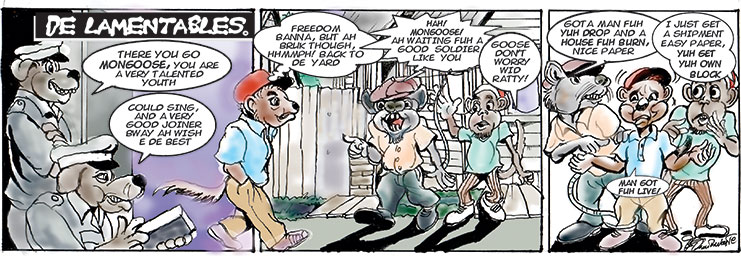Breaking the recycling stables of street crime from old Georgetown to now…
THE paradox of the Sugar workers brings to light the twisted politics of race hate and vindictiveness; of using an ethnic workforce in the party power line to their own detriment; to strike, burn the cane; to undermine the administration of ‘the other’.
Now, as the pendulum swings, their future is to be addressed without malice by the same ‘other’ in the twilight of the forewarned fall of Sugar. But such is the invisible laws that time and time again manifest before us, yet we seem not to learn that Karma exists.
But in the context of the concerns of populations trapped by history in subculture stables and in the UN Decade of the Persons of African Descent, it is the social construct of old Georgetown that must now be re-examined, because Georgetown is the home to almost 30 per cent of the population of Guyana, and home to a large youth population.
Let me offer some background to what I’m referring to. The town of Stabroek that became Georgetown emerged from the Shipping Wharves waterfronts and trade of the 1760s to the 1890s, from La Penitence to Cummingsburg (Tigerbay-Kingston) before Hubert Nathanial Critchlow, (a National hero and stevedore) to the decline of the stevedores in the early 1980s.These waterfront areas provided a major income sustenance for the congested wards of Georgetown. Like all waterfront areas, these were tough areas.
Critchlow himself was a stick-fighting champion among tough men and women like Doris Schoreder, who fist fought robust sailors. They worked and fought hard.
The congested reservation-type wards they lived in inhibited their ambitions and expectations narrowing their worldview, where physical prowess and street cleverness became the tools of survival. Not to say that there were no exceptions that reminded the wider society that this was a human pool of talents and skills beyond physical toughness. They were also the keepers of grass root culture- Bill Rogers came out of Charlestown.
Many of the youth passing through the courts today hail from these areas. A social mythology has long developed to say “What they are, is their choice,” yet the prisons publish the talents of prisoners, within the confines of that controlled environment, but when they step out of the system, there is no interception, no platform to engage.
Thus they return to the same stables with its hovering devils of hopelessness. This is where the broke, hemmed in souls are recruited for hit jobs. A classic example is the killer of Godfrey ‘Saga’ Scipio, Aubrey Bobb of Kitty, who with confidence said “I didn’t want to do this. I had planned when ah come out ah jail fuh sell weed.”
The other reference is “Mazaruni Prisoners graduate from groundbreaking courses.” That is where the Cultural Industries Secretariat comes in. A secretariat to develop markets and economic directions for the Arts, Crafts, Artisans, Culinary products, and to educate on techniques and product competitiveness. This idea I had written about before, and recently in discussion with the current Acting Director of Culture Tamika Boatswain, we both concluded that it was a positive and necessary development.
An ideal interception to make good with what we have, the ‘interception’ in relation to our focus on lawbreakers does not only involve these citizens but the wider arts community, who have not had a minister and team in the third of the ministry dedicated to culture.
Not to say that the ministers were not capable in their own career fields, but culture though revered in all the countries we hold in high esteem has failed to inculcate its relevance in subsequent administrations beginning in the Hoyte era. The most distant been the PPP’s 23 years, they were coerced into doing and to comply with certain cultural regimentations but without any holistic intent.
I have long advocated that culture deserves its own realm, which it had post-Independence. That period laid the foundation for all that still exists now, though fragmented and populated with hunter-gathering cultural practitioners. With the reality of an inevitable transforming economy (oil or no oil) based on adherence to copyright and the decline of the traditional GOP earners, no potential should be left unattended.
Culture, like oil, belongs to worlds of their own. Popular academic accolades (except for those honed in contract and IPR procedures) are not the criteria for the engagement and enhancement of culture towards cultural industries. This requires specific intellectual and ‘burnt fingers know how’ acquired through experience.
The setting up of the Cultural Secretariat will not solve crimes but will ease the annual $150,000,000 spent on feeding ‘yard fowl’ remand prisoners, (our entitled prisoners will have food delivered). This secretariat will enable the expansion of talents, including mine. The 2018 Budget proposed building a Creative Institute. I can’t get any information from anyone in authority on what it’s supposed to do. I, however, have outlined (with many ideas retained) what the Cultural Secretariat will achieve.





.png)









